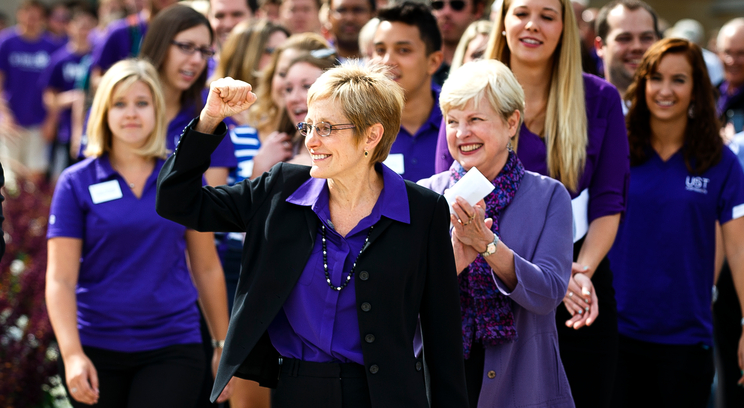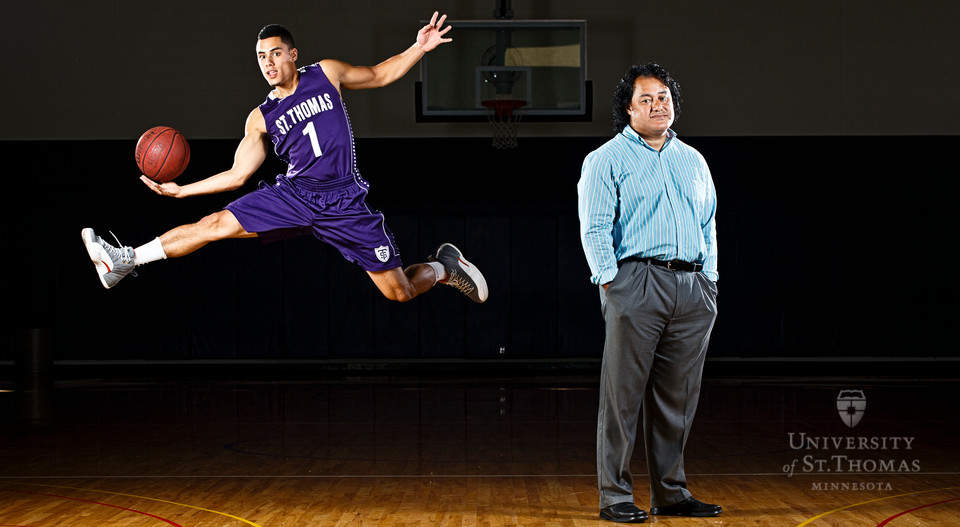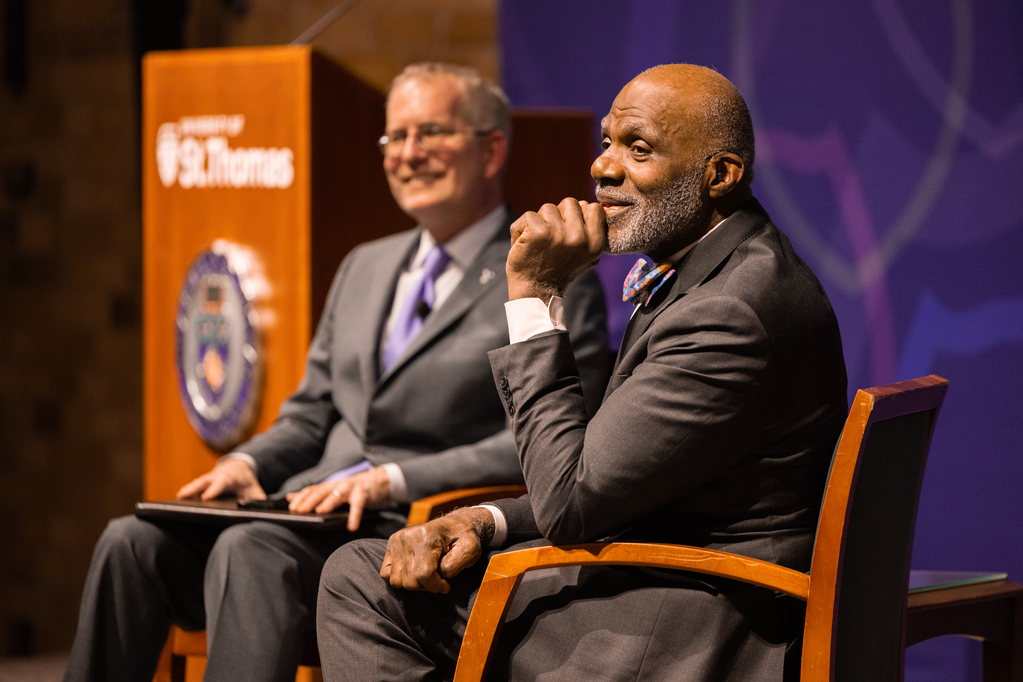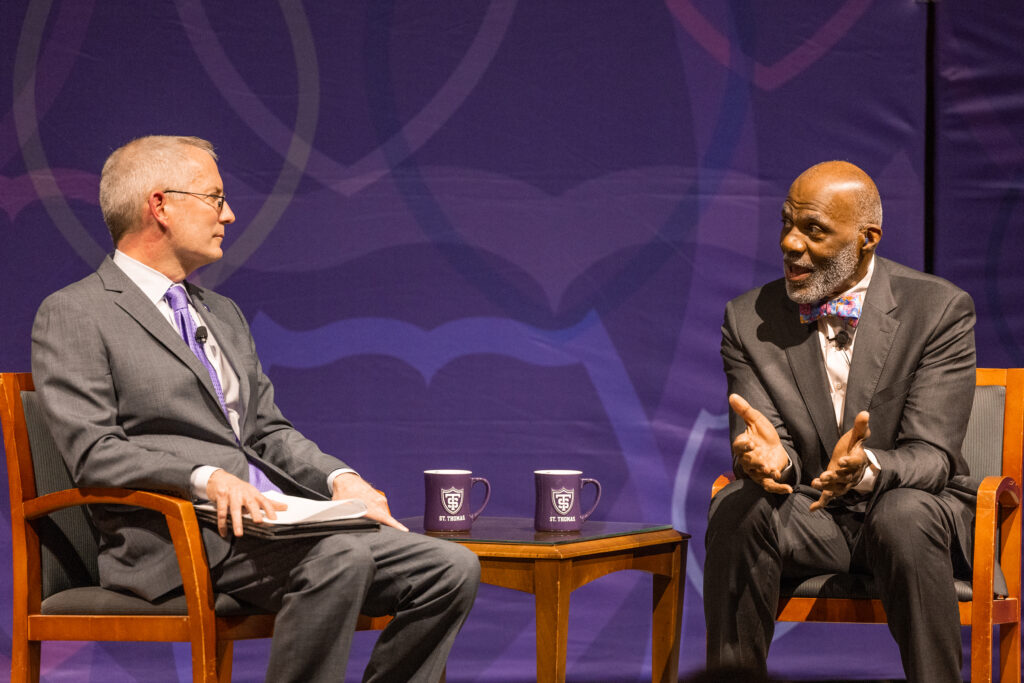Sixty-five years ago, Sara Jane Moore attended a Catholic elementary school in Kentucky and a nun gave the fourth-grader a holy card inscribed with words from Douglas Malloch’s poem, “Be the Best of Whatever You Are.”
Moore never has forgotten those words, and they came to mind when she was asked recently to describe her daughter, Julie Sullivan, the 15th president of the University of St. Thomas. Moore quickly told the story about the 1940s holy card and how it fits her daughter so well today.
“If you are going to do a job,” Moore said, “do it – and do it right. And Julie does.”
The mother and daughter are best friends who think alike. Sullivan independently mentioned the same poem as a motivating factor in her life, and while the poem’s title and closing line reflect her sentiments, the third stanza may be most telling as she begins her presidency of St. Thomas:
We can’t all be captains, we’ve got to be crew, There’s something for all of us here;
There’s big work to do, and there’s lesser to do, And the task you must do is the near.
Sullivan, as the “captain,” knows the spotlight is on her, and it is a rather bright one because of the unusual circumstances. She is the first “outsider” in 80 years, and the first lay person and first woman to serve as president of St. Thomas. As daunting as the task may seem, Sullivan exudes quiet but sure confidence that she will succeed because the “crew” – the St. Thomas community – is unconditionally vested in the future of the university.
“This feels like many of the things that have happened in my life,” she said. “The right opportunity came and at the right time in my life – another opportunity to learn and to grow. Over time, I decided I wanted to be a president, and at a Catholic university. This is the right place for me.”
When pressed to elaborate, Sullivan gave two simple words: “people” and “mission.” Or as Malloch might have said, the “crew” and the “big work” it will do.
“I am extremely impressed by everything I see at St. Thomas,” she said. “It has such a rich history, and I am honored and humbled to be part of it.”
Moore didn’t foresee a college presidency in her daughter’s future but knew early that she would do something important.
“She read all the time, and I mean all the time,” said Moore, who still lives in Live Oak, Fla., where Sullivan attended Suwannee County High School. “She had a book in her hand wherever she went, and she was a perfectionist in everything she did. Everything! She had to be tops. She had straight A’s in elementary school. One time her teacher gave her an A- and she said, ‘I can’t accept that. I deserve an A+.’ The teacher said, ‘Julie, A- is okay.’ And Julie said, ‘No, I want an A+.’”
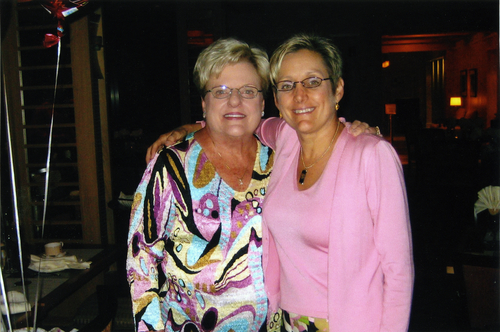
Sullivan and her mother, Sara Jane Moore in 2007. (Photo courtesy President Julie Sullivan)
She had asthma and allergies as a child and at one point missed enough school that the principal called to tell her mother “that if Julie didn’t show up for class more often, they might have to fail her. ‘How can you fail her,’ I asked, ‘if she gets straight A’s?’ He didn’t have a good answer for that.”
Sullivan and her younger brother, David, spent their early years in Jacksonville, Fla., and the family moved to Live Oak when she was 12 after her father bought an automobile dealership.
In seventh grade, a Suwannee teacher impressed with Sullivan’s knowledge of mathematics, gave her the textbook and suggested she work on her own. “At Christmas,” Sullivan said, “I came back and told her, ‘I finished the book. What should I do now?’ The teacher had the foresight not to give me another book, but knew of a social studies teacher working with students who were behind and said, ‘I want you to go to his class and help him.’”
She volunteered at a Head Start location the following summer, and the experience gave her a better understanding of those who had fewer advantages than her.
“I remember one little boy, about 5 years old,” she said. “I gave him a banana at snack time. He looked at it, but he had never seen a banana before and didn’t know how to eat it. He asked me what to do, and I taught him how to peel the banana.”
Marion Harvard taught eighth-grade mathematics and didn’t quite know how to handle an exceptional student such as Sullivan in a classroom with widely divergent skill levels. Sullivan, playing off her experience the previous year, made it easy on her teacher.
“Julie came to me and asked, ‘Could I work through this book on my own?’ ” Harvard said. “She sat in the back of class and very quietly gave me her work at the end of each week. When she finished the book, she got into high school algebra.
“I taught 31 years, and Julie was the most truly independent student who I have known. She was self-taught. That never happened to me another time in my career.”
Sullivan also studied under Harvard’s husband, Wyman, who taught 11th-grade history. He admired her leadership skills with organizations such as Teenagers for Environmental Quality, which began to recycle cans and other materials. He also saw a quiet determination in everything she did, “and I knew she would do whatever she wanted with her life.”
Some teachers were concerned that Sullivan might be too much of a perfectionist, and she recalled how a counselor once called her mother “to make sure I was happy – and balanced. I was; I really was.” Was she a perfectionist? “I don’t think so. I set high standards, and I knew the only way to learn and grow was to make mistakes.”
Jeri Reinholtz has known the lighter side of her best friend since sixth grade. “You’ll never see Julie not laughing and having a good time,” Reinholtz said. “As serious as she is, she’s also so much fun to be around.” And she wasn’t perfect in everything.
“Neither one of us played tennis but we both went out for the tennis team and got laughed off the court,” Reinholtz said. “We also sang in a girls choir, and that’s especially funny because Julie will be the first to say she can’t sing. We did pretty well, but I think she just moved her mouth.”
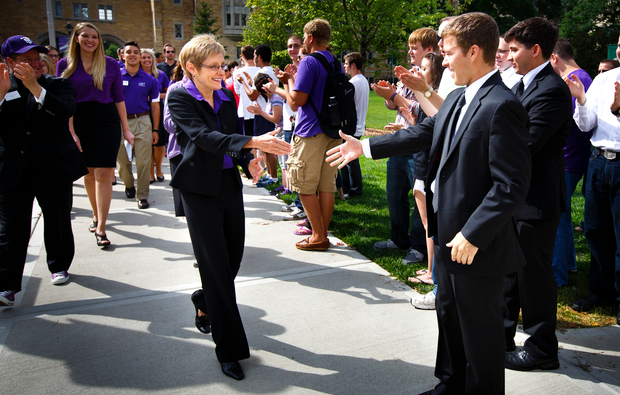
Sullivan shakes hands with students during the march through the Arches Sept. 3. (Photo by Mike Ekern '02)
By the end of their junior year, Sullivan and Reinholtz were done with high school. They left early for college and Sullivan enrolled at nearby Valdosta State across the border in Georgia. She transferred a year later to the University of Florida, where she began her studies as a premed major. But a C in organic chemistry – the first non-A of her life – gave her pause.
“I was not sure I could get into med school,” she said, “so I looked at actuarial science and pharmacy. My family was all in business, so I tried accounting. My father said he didn’t care what I majored in as long as I got a job.”
A taxation class that used the Internal Revenue Service code and U.S. Treasury regulations as textbooks fascinated Sullivan. “The professor taught me how to ‘read legal’ and how to approach legal analysis and interpretation,” she said. “I enjoyed that. It seemed so logical to me.”
She planned to work as a public accountant after graduation but concluded after a six-month internship with what then was Ernst and Whinney that she preferred tax accounting over auditing. She stayed at the University of Florida to receive a master’s degree in taxation and pursued a Ph.D. in business administration after she discovered during an assistantship that she loved to teach.
She married a financial accounting professor during her doctoral studies and they went on the market as a husband- and-wife team, along with their 2-year- old son, Will. They landed on the University of Oklahoma faculty in 1983, stayed four years and had a daughter, Caitlin, before moving to the University of North Carolina, Chapel Hill.
Sullivan had a one-year visiting professorship and she subsequently was hired as a tenure-track faculty member. When she was up for tenure, she had her first “uh-oh” moment.
“It made me ask the question, ‘Do I want to do this for life?’ I wasn’t afraid that I wouldn’t get tenure,” she said, “but it was time for both of us – the school and me – to reflect. I actually thought about whether I should go back to medical school.”
She overcame any uncertainty, received tenure and remained at North Carolina’s Kenan-Flagler Business School for 16 years. She became an Ernst and Young Distinguished Professor and associate dean of the master’s of account- ing program in 1998, when she had another “uh-oh” moment.
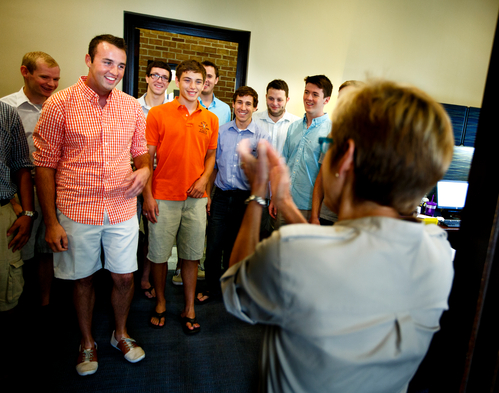
Sullivan claps for the Summit Singers, a student a Capella group, after they surprised her with a few songs in her Aquinas Hall office Sept. 5.
“I had been an academic for 15 years,” she said, “and I was getting bored. I was doing a consulting project, flying around the country to interview 15 to 20 chief financial officers of Fortune 50 companies on factors related to investing resources in tax strategies, and I started to think, ‘I could go into industry and be a CFO. This is pretty exciting!’ ”
Back at Chapel Hill after her travels, Sullivan took a call from the secretary of the new business dean, who wanted to see her the next morning – a Saturday – in his office. She showed up with some trepidation. Was somebody in trouble?
“He asked me to be senior associate dean,” she said. “I asked why and he said, ‘I have interviewed many of our faculty and asked them the question: ‘Who in the school would you most want to evaluate you?’ And they said, ‘Julie.’ I said, ‘Wow. Let me think about it.’
“I knew I needed a new challenge. I never have planned my career, but I always have looked for opportunities to learn and grow. Academics were my passion, so I took the job. It got me beyond using tax and accounting expertise and into marketing and management.”
Her daughter, Caitlin Collins, now 27, remembers the transition from professor to administrator.
“She told me, ‘I’m going to have to work a lot more hours and travel more, and I won’t be around as much,’” Collins said. “I was just old enough to get it and grasp the implications. I was so thankful that she gave me the truth and treated me as an adult even though I wasn’t. She didn’t sugarcoat it, and she let me voice how I felt. I was supportive, of course. It was one of my best ‘best-friend’ conversations with my mom.”
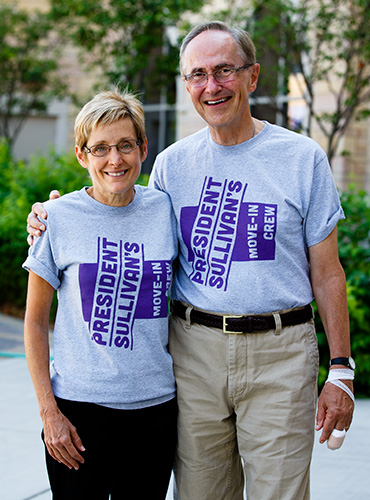
Sullivan with her husband, Bob, during move-in day Aug. 31. (Photo by Mike Ekern '02)
Sullivan and her husband divorced in 2001. She served as interim dean at Kenan-Flagler in 2002-2003, leading a $180 million capital campaign, before moving to the University of California- San Diego for a joint appointment as a professor in the graduate Rady School of Management and the School of International Relations and Pacific Studies. She married Bob Sullivan, founding dean of Rady, in 2003.
One night at a dinner party, she met Dr. Mary Lyons, president of the University of San Diego (and former president of the College of St. Benedict). At a subsequent party at Lyons’ home, the host mentioned that she was recruiting a provost. The position intrigued Sullivan.
“It was another opportunity to learn and to grow and to get beyond involvement in a business school – to understand disciplines across a campus,” she said. “I chose to expand my horizons once again. My time at Chapel Hill had helped me further appreciate the importance of a liberal arts-based university, and I also was interested in an institution with a faith base (the University of San Diego is Catholic).
“Before my interview, I went over to the campus and just walked around. I joined a group of prospective students and parents and observed people. I came away with a strong sense that this was a caring and welcoming community. People would look at you and say hi. It just felt right.”
Sullivan became provost and executive vice president in 2005 and had a whirlwind eight years. She hired 175 new faculty, doubled the faculty research grants program and helped to establish an engineering school, an international center, a school for peace studies and a center for Catholic thought and culture. Her most-celebrated achievement may have been San Diego’s designation as a “Changemaker Campus” by Ashoka, an organization that supports social entrepreneurs.
“Julie led our Ashoka effort, and it was pretty incredible,” said Andy Allen, Ph.D., interim provost who served as associate provost under Sullivan. “We had a conference here last spring, and it reaffirmed what we are doing. Her leadership made it a successful event.”
San Diego deans are unstinting in their praise of Sullivan, each calling her a good listener who worked closely with them. Dave Pyke, Ph.D., dean of the School of Business, synthesized their assessment of their former boss:
“Absolutely terrific,” he said. “That’s what I told deans of other schools when they were sitting around a table at a conference commiserating about their provosts and how they didn’t understand us. I always found Julie incredibly fair ... and she pushed me to really aim high.”
Sullivan’s initial impression of San Diego – that it was a caring and welcoming community – was proven over and over again. She fell in love with the place and her role.
“What I liked the most was the chance to inspire and support people to set and achieve aspirations,” she said. “We did so much together. It became a matter of creating a vision and helping people realize how much they could achieve.”
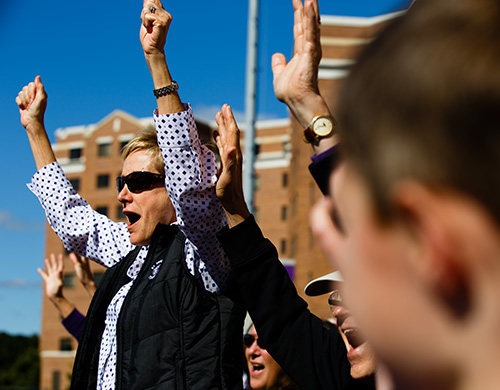
Sullivan cheers for the football team during the Tommie Johnnie game Sept. 21. (Photo by Mike Ekern '02)
Her contentment with San Diego led Sullivan to rebuff several St. Thomas attempts to interest her in the presidency from which Father Dennis Dease retired. She ignored an email inquiry from a search firm (“sorry, not interested, not going to move”) and said no when John Morrison, a trustee and chair of the search committee, reached her in October at a conference in Mexico.
But Morrison’s request – “why won’t you just talk to us?” – did lead her to call Ron Fowler, chair of the San Diego board, a 1966 St. Thomas alumnus and a St. Thomas trustee. He encouraged her to talk to Morrison. Her husband had similar advice: “go through the interview process and get a feel for a president’s job and whether it’s something you’d like to do some day.”
She met with the search committee in November and December, and she still said “no.” Morrison wouldn’t accept the answer and, along with several search committee members, visited her in January in San Diego. She returned to St. Thomas in early February for weekend visits with other trustees, senior administrators and deans.
“I had until Wednesday (Feb. 6) to say yea or nay,” she said. “I called in sick at San Diego on Tuesday because I was sick – I was struggling with the decision. I did a lot of praying and reflecting, called friends, had lunch with my son and talked with my daughter. On Wednesday morning, I called my mother and said, ‘I’m going to do it, momma.’ ”
She credits her husband as influential – and logical – in her decision- making process.
“She had to rely not on what any one individual said but on her own intuition,” he said. “She first turned it down for a lot of reasons. The job wasn’t here (in San Diego) and she would have to balance all of the change. What I did tell her was that if you like and are confident in the individuals with whom you will work, what’s your intuition tell you?”
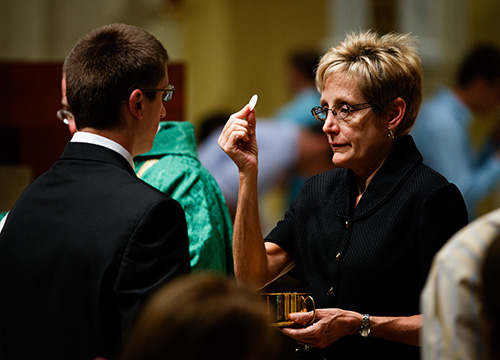
Sullivan distributes the Eucharist at opening mass Sept 8. (Photo by Mike Ekern '02)
It was exactly that – the people – who ultimately persuaded Sullivan that St. Thomas was the right place for her. She also strongly resonated with the university’s mission – to educate “morally responsible leaders” who will “advance the common good.”
After the Board of Trustees unanimously elected her as president on Feb. 14, she spent two or three days each month on campus getting to know people. She became president July 1, and after a busy month filled with her 10th wedding anniversary, her daughter’s wedding, the birth of grandson James (to son Will and his wife Yu) and her own 56th birthday, she settled into 100 Aquinas Hall.
She also moved into Morrison House, the president’s residence on Summit Avenue. She had given her mother a mini-iPad for Mother’s Day, and one of the first things she did was to call her in Florida and FaceTime a walk through the house. The virtual tour proved one thing to her mother.
“She’s going to love it at St. Thomas,” Moore said. “She told me, ‘You know, momma, I really feel at home here.’ ”
Read more from St. Thomas magazine.
